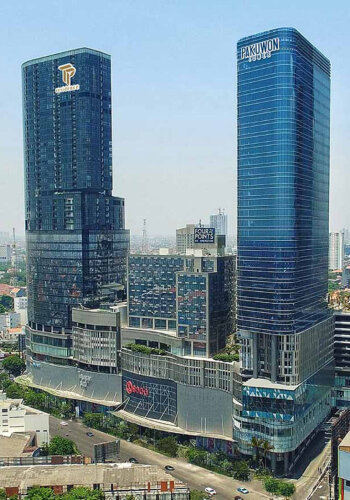Best Tax Increment Financing Lawyers in Surabaya
Share your needs with us, get contacted by law firms.
Free. Takes 2 min.
List of the best lawyers in Surabaya, Indonesia

Jiwangga Law Office | Lawyer Surabaya | Advokat Surabaya | Pengacara Surabaya
30 minutes Free ConsultationAbout Tax Increment Financing Law in Surabaya, Indonesia
Tax Increment Financing (TIF) is a financial tool used by municipalities, such as Surabaya, to encourage economic development in specific areas. By capturing the future tax revenues generated by an increase in property values within a designated zone, Surabaya can reinvest those funds into community infrastructure and development projects. This method allows for urban revitalization without raising taxes on current property owners. In Surabaya, TIF law has been structured to support sustainable urban development while ensuring compliance with Indonesia's national regulations.
Why You May Need a Lawyer
There are several situations where individuals or businesses might require legal assistance concerning TIF in Surabaya:
- Understanding Eligibility: Navigating the criteria and regulations to determine if your property or project qualifies for TIF.
- Negotiating Terms: Engaging in negotiations regarding the terms of financing agreements can often require professional legal guidance.
- Compliance and Regulation: Ensuring full compliance with local government requirements and national laws can be complex.
- Dispute Resolution: Handling disputes that may arise with local authorities or other stakeholders involved in TIF initiatives.
- Contractual Agreements: Reviewing or drafting contracts related to development projects funded by TIF.
Local Laws Overview
Understanding TIF laws relevant to Surabaya involves grasping both local ordinances and broader Indonesian legal frameworks. Key aspects include:
- Zone Designation: Areas eligible for TIF must be officially designated by local government regulations.
- Revenue Allocation: Rules governing how incremental tax revenues are allocated and managed for specific projects.
- Project Qualifications: Criteria for projects that qualify for TIF, typically involving infrastructure and community development.
- Transparency Requirements: Regulations that mandate full disclosure and public access to TIF project details and financial statements.
- Reporting and Accountability: Obligations for municipalities to report the financial performance and outcomes of TIF projects regularly.
Frequently Asked Questions
What is the main purpose of TIF in Surabaya?
The primary goal is to stimulate economic development and revitalize underdeveloped neighborhoods by reinvesting in infrastructure and community projects.
Are there specific areas in Surabaya where TIF is applicable?
Yes, TIF is only applicable in zones that have been officially designated by the local government, focusing on areas needing economic revitalization.
How is TIF funding generated?
TIF funding is generated through the future increase in property tax revenues, resulting from increased property values within the TIF district over time.
What types of projects can be funded through TIF?
Projects typically include infrastructure improvements, community facilities, and other development initiatives that promote economic growth and community well-being.
Who decides which projects receive TIF funding?
Local government authorities, often in collaboration with community stakeholders, decide on the allocation of TIF funds to eligible projects.
Can businesses apply for TIF funding?
Yes, businesses can apply, but they must meet the criteria set by local regulations and demonstrate that their projects will benefit the designated TIF zone.
How long does a TIF district last?
The duration can vary, but TIF districts in Surabaya typically last until the project has achieved its funding goals, often spanning several years.
Is public input considered in the TIF process?
Yes, public meetings and consultations are often part of the TIF process to ensure community input and transparency.
Can TIF lead to higher taxes for residents?
No, the purpose of TIF is to utilize anticipated tax revenue increases, not to raise current property taxes for existing residents.
What happens if a TIF project does not succeed?
Failures are handled carefully, with strategies in place for adjustment or redeployment of resources to alternative projects or uses.
Additional Resources
Here are some resources and organizations that could be helpful:
- Surabaya City Government's Urban Development Department - for local TIF policies and zone maps.
- Investment Coordinating Board of Indonesia - for national legislative information and investor resources.
- Local Business Development Councils - for guidance on complying with TIF-related business requirements.
Next Steps
If you need legal assistance with TIF in Surabaya, consider the following steps:
- Research: Begin by gathering as much information as you can about your specific situation concerning TIF.
- Consultation: Schedule a consultation with a lawyer who specializes in finance and real estate in Surabaya to discuss your eligibility and options.
- Document Preparation: Collect relevant documents and agreements needed for a TIF-related legal consultation.
- Engage Legal Services: If necessary, formally engage legal services to help navigate complex TIF regulations and transactions.
- Ongoing Review: Stay informed and involved in the process, ensuring that all legal and regulatory requirements are continuously met.
Lawzana helps you find the best lawyers and law firms in Surabaya through a curated and pre-screened list of qualified legal professionals. Our platform offers rankings and detailed profiles of attorneys and law firms, allowing you to compare based on practice areas, including Tax Increment Financing, experience, and client feedback.
Each profile includes a description of the firm's areas of practice, client reviews, team members and partners, year of establishment, spoken languages, office locations, contact information, social media presence, and any published articles or resources. Most firms on our platform speak English and are experienced in both local and international legal matters.
Get a quote from top-rated law firms in Surabaya, Indonesia — quickly, securely, and without unnecessary hassle.
Disclaimer:
The information provided on this page is for general informational purposes only and does not constitute legal advice. While we strive to ensure the accuracy and relevance of the content, legal information may change over time, and interpretations of the law can vary. You should always consult with a qualified legal professional for advice specific to your situation.
We disclaim all liability for actions taken or not taken based on the content of this page. If you believe any information is incorrect or outdated, please contact us, and we will review and update it where appropriate.
















